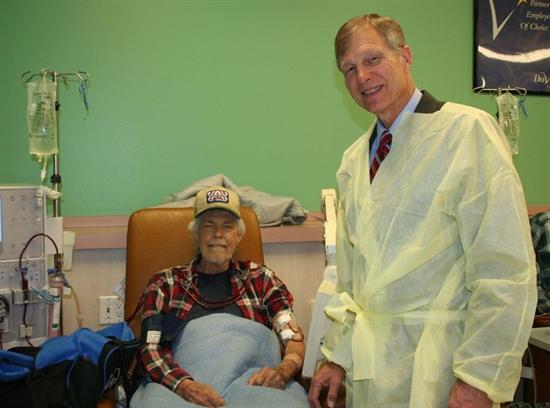Babin visits Cleveland dialysis clinic
Washington,
March 16, 2015
Babin visits Cleveland dialysis clinic
The Cleveland Advocate By Stephanie Buckner Before the Davita Cleveland Dialysis Center moves to its new location, a 10,000 square-foot facility near Southside Elementary School, staff members got the opportunity to show the facility to U.S. Representative Brian Babin, who took a tour of the building on Monday, March 9, speaking to doctors and patients. According to statistics released by the healthcare provider, there are currently more than 26 million American adults living with some form of chronic kidney disease. If left untreated, the disease can ultimately progress to kidney failure. The rising expenses associated with treatment have led to an increase in mortality rates, which is only expected to rise with recent legislation associated with the Affordable Care Act. The plight is not lost on Babin, who was a doctor for many years before taking on a position in national politics. Babin spoke with each patient as he toured the building, showing genuine interest in the situation, which is considered “life or death” for the many patients who must undergo dialysis treatments. In speaking with local veteran Edward Harris, he commended the man for his military service before receiving an encouraging response. “I won’t ask if you’re Republican or Democrat,” said Harris. “If you’re doing something to save lives, you’ve got my vote.” The visit was a much anticipated one by the doctors and staff members at the center, as it provided them the opportunity to present the current state of the average patient in an informative light. It also enabled them to explain to Babin how the kidney care community is working with U.S. Congress to protect those who depend on dialysis treatments to live. “You either love dialysis or you don’t love dialysis, but this is our family,” said Family Administrator Christine Biggers. “We love our patients. This is the first job I feel that we are really making a difference.” Approximately 84 percent of End Stage Renal Disease, or ESRD, patients depend on Medicare’s ESRD benefit to fund treatments. The benefit was put into place by Congress more than 40 years ago to ensure that all kidney failure patients can have access to the life-sustaining therapy. The main goal of the Davita Cleveland Dialysis Center is to help keep patients alive and fully functioning. Clinic staff member Jonathan Davis presented Babin with an informative series of graphs and statistics on the current state of treatment funding options, also pointing out that portions of the Affordable Care Act will not prove very helpful to continued operations. “We want to change the system as opposed to not treat the patient,” said Davis. |

